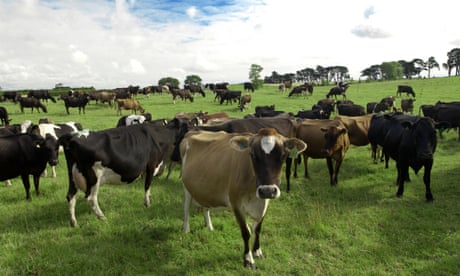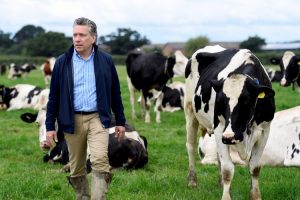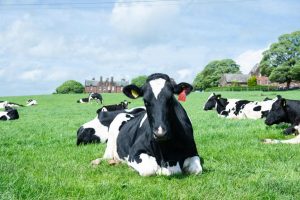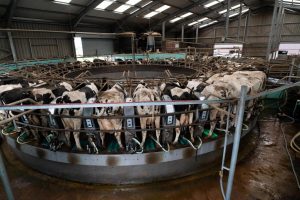
For decades, many of New Zealand’s most influential people didn’t hold seats in parliament. They didn’t pass legislation or regulations. They often didn’t even work in the capital, Wellington.
Yet this group – the elected leaders of advocacy groups Federated Farmers, DairyNZ and Beef + Lamb – exercised immense power over parliament.
“It wasn’t that farmers affected the government. Farmers were the government,” says Dr Hugh Campbell, a professor of sociology at the University of Otago.
Now that power – already weakened by shifts in farmers’ share of exports and changes to New Zealand’s electoral system – is critically threatened from within.
In recent years, the country’s farmers have come under significant pressure for their disproportionate greenhouse gas emissions; the agricultural sector produces more than half of New Zealand’s industry and household emissions.
When Jacinda Ardern’s Labour government began introducing measures aimed at reducing farming’s environmental impacts the major farming advocates worked with the government to soften the impact. But a sizeable minority of disaffected farmers – who call their movement Groundswell – took to the streets to oppose the policies and denounce their ostensible representatives.
According to Campbell, this emerging schism in New Zealand’s farming community threatens to undermine the power of their traditional representatives, who recently wielded that influence to secure $710m in funding from the revenue generated by the country’s emissions trading scheme, even though the agricultural sector is exempt from contributing to those funds until 2025. It also illustrates the difficulty many governments face as they try to reduce agriculture’s climate impact, even when they win support from agriculture’s traditional champions.
“I’ve been accused of being a communist, been told I’ve got no nuts,” says Andrew Hoggard, the president of Federated Farmers. “The more rabid supporters at times get angry with everyone else.”

Part of the reason many farmers are so aggrieved is a feeling that they have lost the influence they once wielded, says Campbell. Between the second world war and 1973, farmers exercised “absolute power”, he says. They generated the vast majority of New Zealand’s exports and were scattered in a way that maximised their power under the country’s old majoritarian electoral system.
The result was a “shadow world” of farming politics which was deeply intertwined with New Zealand’s government, says Campbell. “Farmers had direct access to the highest levels of government, right into the cabinet room.”

That power began declining in 1973, when Britain’s entry to the European economic zone, global oil shocks and a collapse in commodity prices undercut farmers. This was exacerbated by the 1993 introduction of a proportional electoral system, which strengthened the political power of urban New Zealanders.
“If you add together all the farmers in the country, we’re maybe one electoral seat,” says Hoggard. “It’s middle-class Auckland swing voters who determine the government. That makes things a hell of a lot more tricky for me than it was for whoever was in the job 30 years ago.”
But even if they were no longer dominant, says Campbell, farmers “had enough residual power to keep the government off their back”.
An ‘attack on farming’
In 2017, however, Ardern’s Labour party won power in a shock election result and proposed a raft of policies designed to improve water quality, reduce pollution and cut greenhouse gas emissions. In 2019, Federated Farmers, DairyNZ and Beef + Lamb agreed to work with the government on how to bring agriculture into the country’s emissions trading scheme, from which farmers had long fought to remain exempt.
“The old days of stomping our feet and saying, ‘This is how it’s gotta be and we don’t care what anyone in town thinks’? They’re long gone,” says Hoggard.
The proposals prompted outrage among farmers, as did agricultural representatives’ engagement with them. Bryce Mckenzie, the founder of Groundswell, called the government’s proposals an “attack on farming”. Groundswell’s subsequent protests were attended by thousands of farmers and became venues to air wider grievances. At some, attendees flew Trump flags and carried signs with phrases like “Make Ardern Go Away” and “Media Treason”.
Much of their anger was directed at DairyNZ and Beef + Lamb, which Groundswell believes have grown too close to the government. While Mckenzie is comfortable with the approach of Federated Farmers, he says DairyNZ and Beef + Lamb “are not doing the best for farming overall”.
Andrew Morrison, the chair of Beef + Lamb, said: “Generally speaking, there’s no difference between the Federated Farmers, DairyNZ and Beef + Lamb positions. Groundswell are perceiving a difference … We’re all signed up to the same program.”
Hoggard, meanwhile, says Groundswell’s success has prompted Federated Farmers to develop a more outspoken communication strategy. “The risk in the back of our mind,” says Hoggard, “is that [farmers] ask: ‘What do I need to pay my Federated Farmers subscription for, when Groundswell is out there saying this more vocally and aggressively?”
A DairyNZ spokesperson said its chair, Jim van der Poel, was unavailable for an interview.
In March, Groundswell’s frustrations prompted its leaders to decline an invitation to meet with Ardern because DairyNZ and Beef + Lamb representatives would also be present. Mckenzie called them “pet lobby groups” of the government and “failing establishment bodies”. Later, in a letter to DairyNZ members, van der Poel denounced Groundswell’s “misinformation, personal attacks and political tricks”.
“They’re not on talking terms any more,” says Hoggard.
The consequences of that disunity – and the political weakness it exposes – could be profound, says Morrison. “This isn’t a threat, but the government has been clear that if we can’t find a solution, agriculture will end up in the emissions trading scheme … It’s important that the sector be united.”
“That schism will widen,” predicts Campbell. In the worst-case scenario, he believes New Zealand could see “a massive radicalisation” of rural populations. “We underestimate to our peril the extent to which hard rightwing, ultra-libertarian radicalisation can take root in New Zealand.”
In the short term, he says, the emerging schism creates a political bind. “Farming representatives are in a really awkward position: they know where they have to go … but they’re up against a group that doesn’t want to go anywhere at all.
“It’s going to be increasingly hard to paper over what is essentially a fracture in people’s sense of reality,” he concluded. “Federated Farmers and major agricultural sectoral groups simply can’t live in a world of climate denialism and denial of environmental impacts.”

























